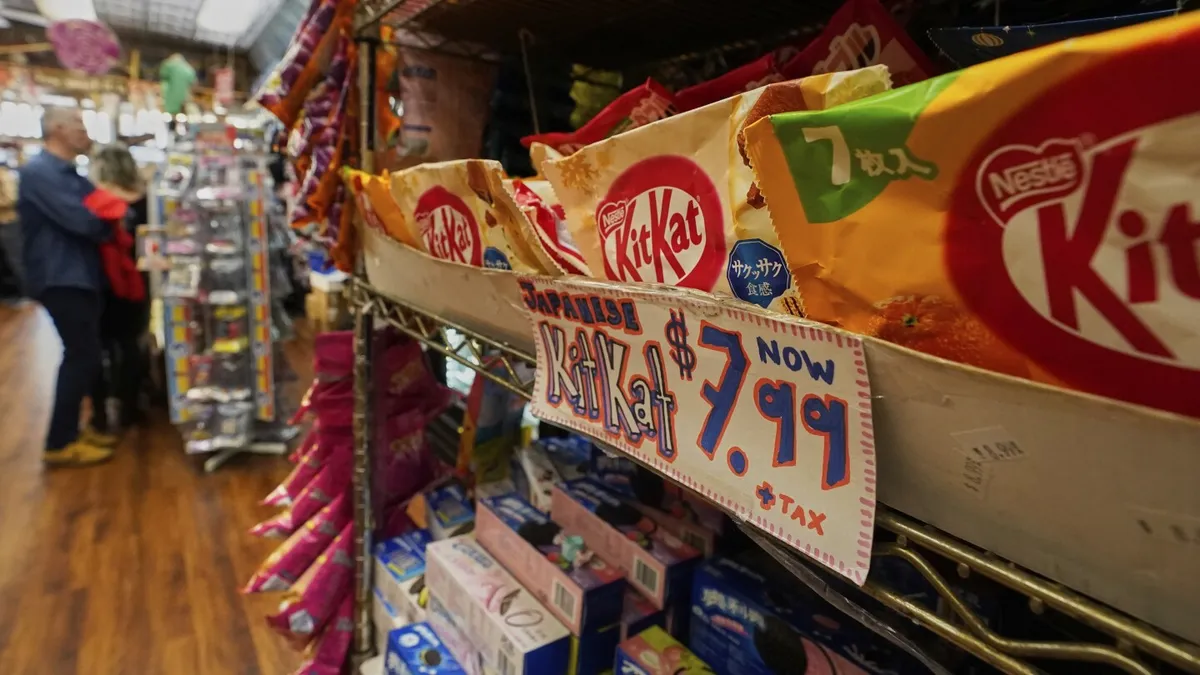
Located in the heart of New York’s Lower East Side, Economy Candy is a treasure trove of sweets, offering an impressive selection of candies from around the world. From gummies sourced from Germany to lollipops from Spain and chocolates from Japan, this beloved candy store is a nostalgic haven for candy lovers. However, owner Mitchell Cohen is concerned about the impact of recent tariffs introduced by President Donald Trump on his diverse inventory of over 2,000 confectionery items.
As Cohen surveys his colorful shelves lined with bright jellybeans and exotic Kit Kats, he reflects on the extensive reach of these tariffs. “I think all of them,” he states, highlighting how the sweeping tariffs are poised to affect nearly every aspect of his business. The candy industry, valued at approximately $54 billion in the U.S., is grappling with rising costs that are being exacerbated by these new trade policies.
Cohen had just begun to see relief from inflation-related price increases from suppliers when the tariff threats emerged. He aims to keep Economy Candy affordable, but fears that prices may skyrocket in the coming months. “I think it’s gonna be another round of this hyperinflation on some items,” he warns. The implications of these tariffs extend beyond simple price hikes; they could fundamentally alter the way consumers shop for candy.
The candy industry has already experienced significant price increases: candy and gum prices have surged by about 34% over the past five years, and 89% since 2005, according to data from the Consumer Price Index. Today, price is the leading factor influencing consumer purchasing decisions, overshadowing even the buyer's mood, as indicated by the National Confectioners Association.
Approximately one-third of Economy Candy's products are imported, with a wide range of international selections prominently displayed. Cohen boasts about having “more German Haribo varieties than the Haribo store in Germany,” alongside a plethora of gummies from France, Austria, and Britain. However, the impact of tariffs is starkly evident on certain products. For instance, Pistachio Snickers bars from India now face a steep 26% tariff, while passion fruit mousse Snickers from Portugal are hit with a 20% levy from the EU.
Even American-made products are not immune to price inflation due to the tariffs. For example, while Snickers bars are produced in Texas, they contain ingredients sourced from various countries, including chocolate from Guyana, peanuts from Argentina, and sugar from Brazil. Each of these components is subject to tariffs, which adds to the overall cost of the final product.
“There’s a lot of ingredients in there that have to come from other countries,” explains Andreas Waldkirch, an economics professor at Colby College specializing in international trade. “Unless you’re talking about something very simple from your local farmers market, almost every product relies on ingredients from elsewhere.” This reality underscores the indirect costs that will ultimately drive up prices for consumers.
Cohen’s connection to Economy Candy runs deep; he inherited the store from his parents, who took it over from their parents. The store has seen various transformations over its 88-year history, shifting from shoe and hat repairs during the Great Depression to becoming a candy paradise. The store has faced its share of challenges, from the aftermath of the September 11 attacks to the COVID-19 pandemic, which forced a pivot to online sales.
Now, with tariffs potentially reshaping the landscape, Cohen is uncertain about the future. The average U.S. tariff could rise to nearly 25%, representing the highest rate in over a century. Cohen recognizes the need for American manufacturing but emphasizes the reliance on imported raw materials essential for his products. “And it’s not like I can get a green tea Japanese Kit Kat from an American company,” he laments.
Despite the challenges, Cohen remains hopeful. As he navigates the complexities of tariffs and pricing, he is determined to maintain the store’s reputation as an affordable destination. With the first signs of the tariff’s impact already arriving—such as a 5% surcharge from a French supplier—he is reminded of the weight these economic changes carry, not just for him, but for the families relying on small businesses like his.
In the face of uncertainty, Mitchell Cohen aims to keep Economy Candy a joyful escape for visitors, encapsulating a nostalgic experience that transcends the pressures of modern economic challenges. “You travel back to a time when nothing mattered,” he reflects, as he stands surrounded by the vibrant candies that have brought joy to generations.